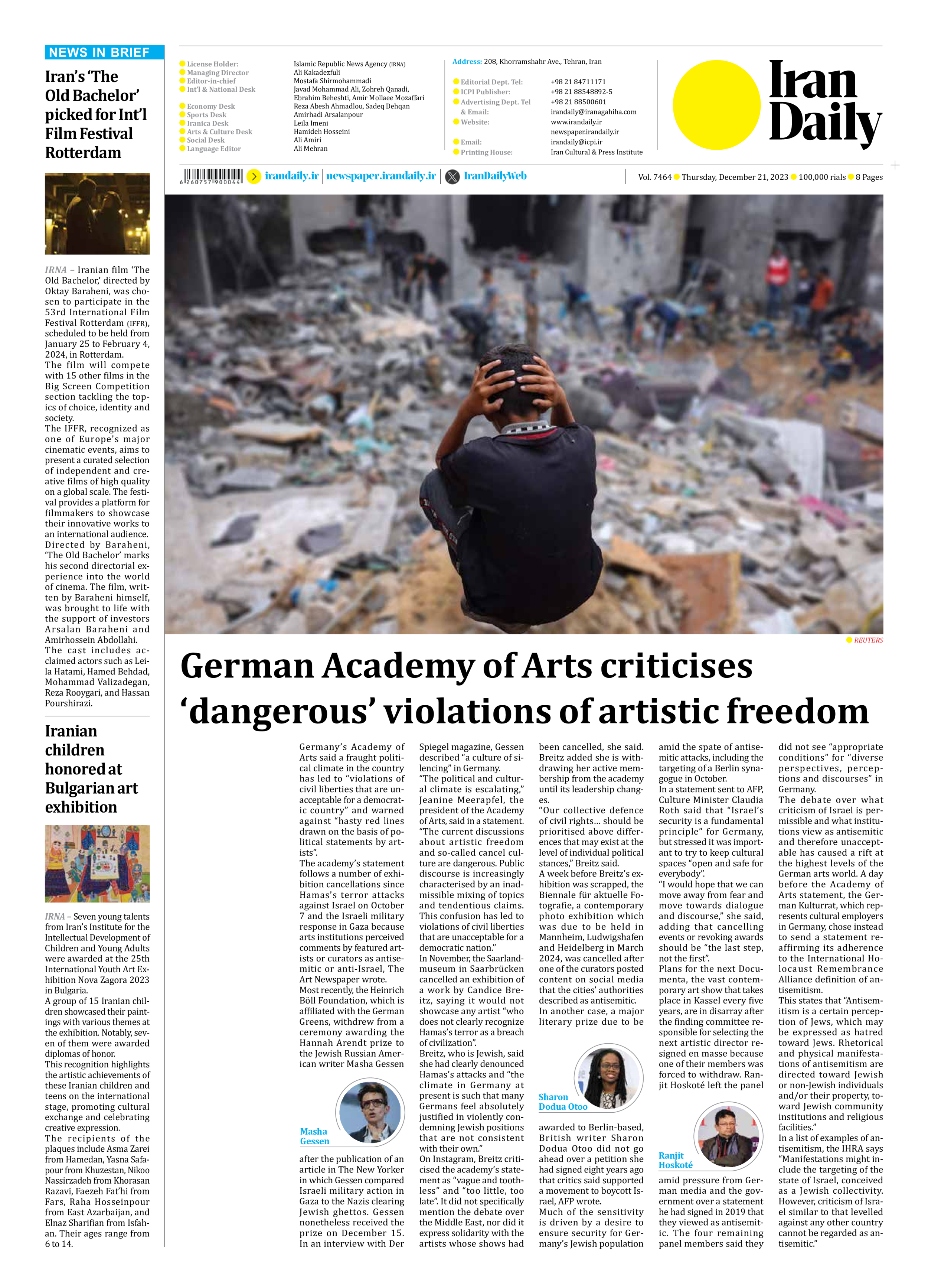
German Academy of Arts criticises ‘dangerous’ violations of artistic freedom
Germany’s Academy of Arts said a fraught political climate in the country has led to “violations of civil liberties that are unacceptable for a democratic country” and warned against “hasty red lines drawn on the basis of political statements by artists”.
The academy’s statement follows a number of exhibition cancellations since Hamas’s terror attacks against Israel on October 7 and the Israeli military response in Gaza because arts institutions perceived comments by featured artists or curators as antisemitic or anti-Israel, The Art Newspaper wrote.
Most recently, the Heinrich Böll Foundation, which is affiliated with the German Greens, withdrew from a ceremony awarding the Hannah Arendt prize to the Jewish Russian American writer Masha Gessen after the publication of an article in The New Yorker in which Gessen compared Israeli military action in Gaza to the Nazis clearing Jewish ghettos. Gessen nonetheless received the prize on December 15. In an interview with Der Spiegel magazine, Gessen described “a culture of silencing” in Germany.
“The political and cultural climate is escalating,” Jeanine Meerapfel, the president of the Academy of Arts, said in a statement. “The current discussions about artistic freedom and so-called cancel culture are dangerous. Public discourse is increasingly characterised by an inadmissible mixing of topics and tendentious claims. This confusion has led to violations of civil liberties that are unacceptable for a democratic nation.”
In November, the Saarlandmuseum in Saarbrücken cancelled an exhibition of a work by Candice Breitz, saying it would not showcase any artist “who does not clearly recognize Hamas’s terror as a breach of civilization”.
Breitz, who is Jewish, said she had clearly denounced Hamas’s attacks and “the climate in Germany at present is such that many Germans feel absolutely justified in violently condemning Jewish positions that are not consistent with their own.”
On Instagram, Breitz criticised the academy’s statement as “vague and toothless” and “too little, too late”. It did not specifically mention the debate over the Middle East, nor did it express solidarity with the artists whose shows had been cancelled, she said. Breitz added she is withdrawing her active membership from the academy until its leadership changes.
“Our collective defence of civil rights… should be prioritised above differences that may exist at the level of individual political stances,” Breitz said.
A week before Breitz’s exhibition was scrapped, the Biennale für aktuelle Fotografie, a contemporary photo exhibition which was due to be held in Mannheim, Ludwigshafen and Heidelberg in March 2024, was cancelled after one of the curators posted content on social media that the cities’ authorities described as antisemitic.
In another case, a major literary prize due to be awarded to Berlin-based, British writer Sharon Dodua Otoo did not go ahead over a petition she had signed eight years ago that critics said supported a movement to boycott Israel, AFP wrote.
Much of the sensitivity is driven by a desire to ensure security for Germany’s Jewish population amid the spate of antisemitic attacks, including the targeting of a Berlin synagogue in October.
In a statement sent to AFP, Culture Minister Claudia Roth said that “Israel’s security is a fundamental principle” for Germany, but stressed it was important to try to keep cultural spaces “open and safe for everybody”.
“I would hope that we can move away from fear and move towards dialogue and discourse,” she said, adding that cancelling events or revoking awards should be “the last step, not the first”.
Plans for the next Documenta, the vast contemporary art show that takes place in Kassel every five years, are in disarray after the finding committee responsible for selecting the next artistic director resigned en masse because one of their members was forced to withdraw. Ranjit Hoskoté left the panel amid pressure from German media and the government over a statement he had signed in 2019 that they viewed as antisemitic. The four remaining panel members said they did not see “appropriate conditions” for “diverse perspectives, perceptions and discourses” in
Germany.
The debate over what criticism of Israel is permissible and what institutions view as antisemitic and therefore unacceptable has caused a rift at the highest levels of the German arts world. A day before the Academy of Arts statement, the German Kulturrat, which represents cultural employers in Germany, chose instead to send a statement reaffirming its adherence to the International Holocaust Remembrance Alliance definition of antisemitism.
This states that “Antisemitism is a certain perception of Jews, which may be expressed as hatred toward Jews. Rhetorical and physical manifestations of antisemitism are directed toward Jewish or non-Jewish individuals and/or their property, toward Jewish community institutions and religious facilities.”
In a list of examples of antisemitism, the IHRA says “Manifestations might include the targeting of the state of Israel, conceived as a Jewish collectivity. However, criticism of Israel similar to that levelled against any other country cannot be regarded as antisemitic.”







